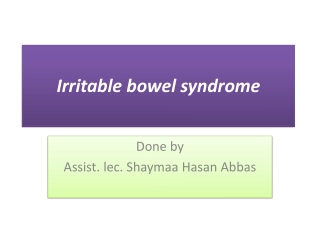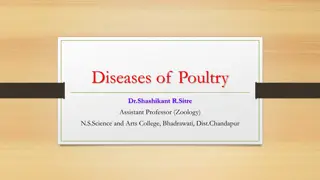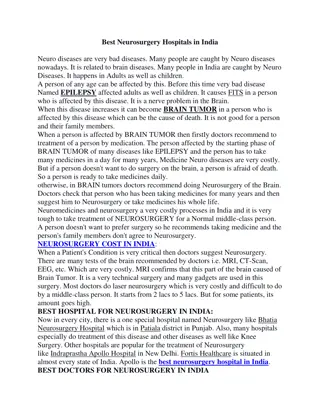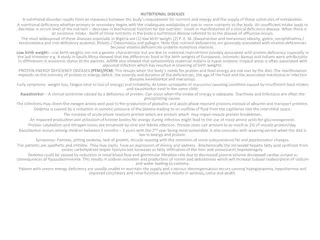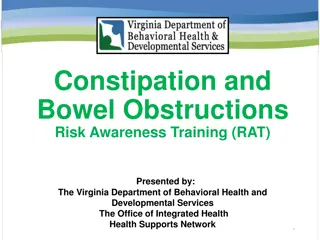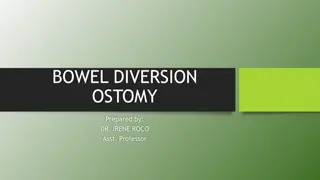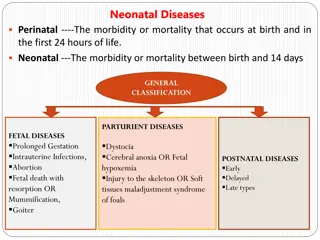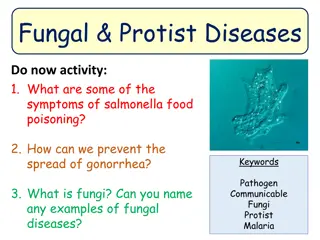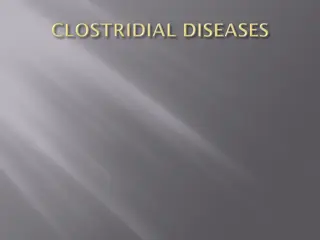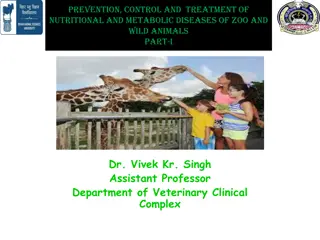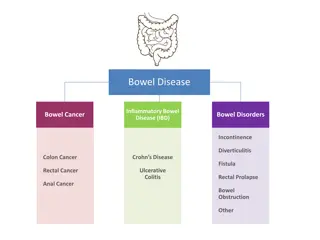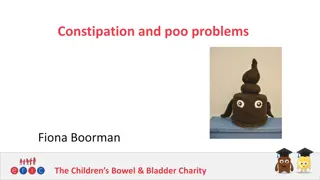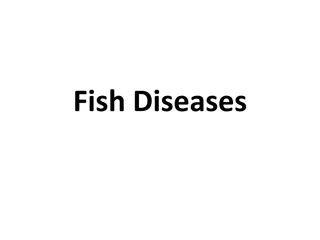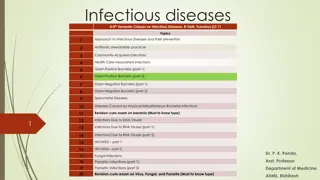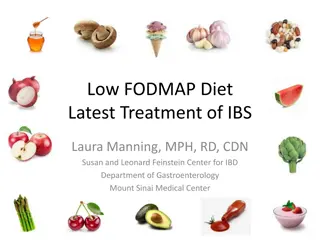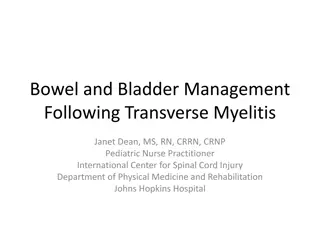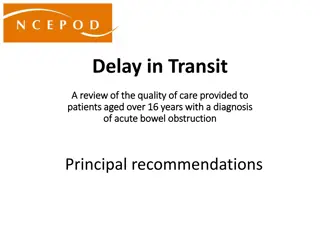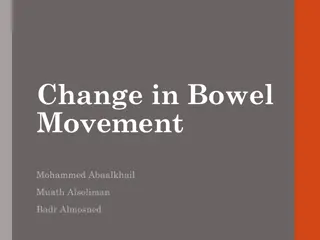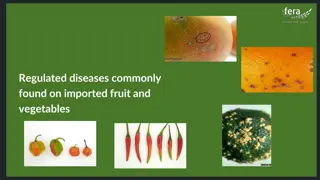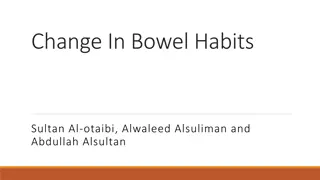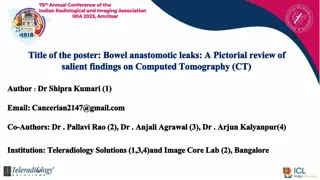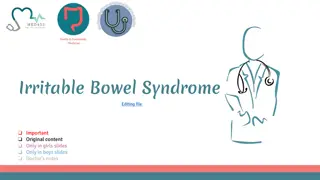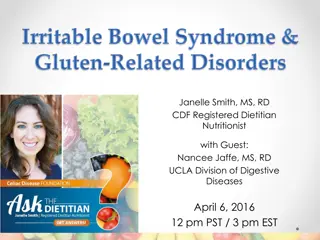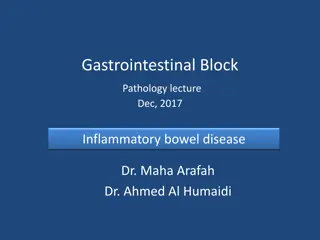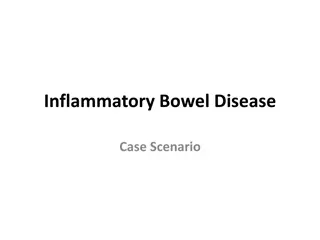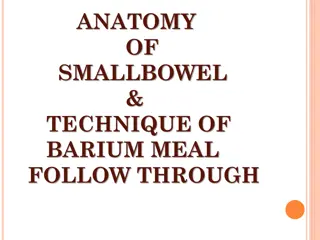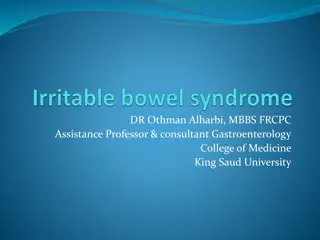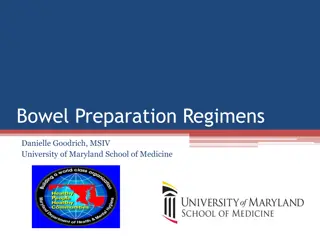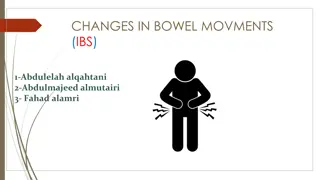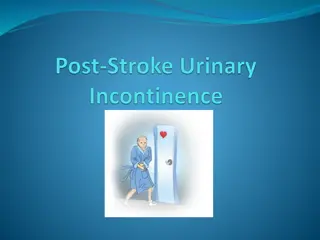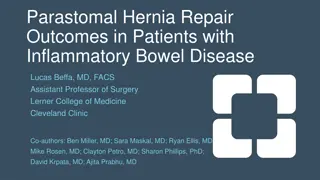Irritable bowel syndrome
Information on the aims of treatment, aggravating factors, treatment timescale, and non-drug and drug treatment options for irritable bowel syndrome (IBS). It also includes a list of relevant medications and their effects.
16 views • 39 slides
Study Materials for Learning about Diseases and Telling Time
Dive into a collection of study resources covering test corrections, news updates from China, new vocabulary related to diseases, and report writing tasks. Explore new words, grammar rules for telling time, and objectives for each day of the week. Get insights on recent developments in China, includ
0 views • 13 slides
Overview of Poultry Diseases and their Causes
Poultry diseases caused by viruses and bacteria are a significant concern for poultry farmers. Viral diseases like Ranikhet Disease, Fowl Pox, and Avian Leucosis can have high mortality rates and severe symptoms. Bacterial diseases such as Tick Fever, Tuberculosis, Fowl Cholera, and Infectious Coryz
2 views • 12 slides
Periodontal Treatment Considerations for Medically Compromised Patients
Patients with significant medical conditions may require special considerations for periodontal treatment. Medical issues such as hemorrhagic disorders, renal diseases, liver diseases, pulmonary diseases, infectious diseases, pregnancy, medications, and cancer therapies can impact oral health and tr
1 views • 87 slides
Best Neurosurgery Hospitals in India
Neuro diseases are very bad diseases. Many people are caught by Neuro diseases nowadays. It is related to brain diseases. Many people in India are caught by Neuro Diseases. It happens in Adults as well as children.\nA person of any age can be affected by this. Before this time very bad disease Named
1 views • 2 slides
Hannah's Struggle with Inflammatory Bowel Disease: A Journey of Challenges and Lessons
Hannah, a vibrant young woman with a bustling social life and active routines, experiences a series of setbacks in her battle with Inflammatory Bowel Disease (IBD). Her journey highlights the importance of timely diagnosis, access to proper care, and comprehensive support services to manage the cond
0 views • 9 slides
Overview of Nutritional Diseases and Disorders
Nutritional diseases arise from imbalances between the body's nutrient and energy requirements and their supply. Nutritional deficiencies can lead to clinical diseases, while excessive intake can result in diseases of affluence. Common nutritional disorders include low birth weight, PEM, obesity, go
4 views • 6 slides
Understanding Constipation and Bowel Obstructions Risk
This training program by The Virginia Department of Behavioral Health and Developmental Services focuses on defining constipation, identifying causes and complications, recognizing bowel obstructions, and understanding signs and symptoms of fecal impaction. Caregiver recommendations and the roles of
0 views • 26 slides
Understanding Bowel Diversion Ostomy: Definition, Classification, and Management
Bowel diversion ostomy involves creating an opening in the gastrointestinal tract to divert and drain fecal material. This summary covers the definition, purpose, classification (permanent vs. temporary ostomies, types of intestinal ostomies), management, assessment, and changes associated with osto
0 views • 14 slides
Neonatal Diseases
Neonatal and postnatal diseases in livestock, with a focus on perinatal, neonatal, and postnatal stages. It covers common classifications, causes, and risk factors associated with these diseases, particularly focusing on neonatal diarrhea (Calf Scour). The content delves into noninfectious and infec
0 views • 33 slides
Understanding Fungal and Protist Diseases: Impacts and Prevention
Fungi and protists play significant roles as pathogens, causing diseases in both humans and plants. Fungal diseases like athletes foot and protist diseases like malaria can have serious impacts on health. Control measures such as understanding symptoms, spread mechanisms, and prevention strategies a
0 views • 10 slides
Overview of Clostridial Diseases Caused by Clostridium Bacteria
Clostridial diseases are caused by bacteria of the genus Clostridium, which are anaerobes commonly found in soil, feces, and healthy animal tissues. These bacteria can lead to various diseases in animals such as black quarter, gas gangrene, necrotic dermatitis, and more. Understanding the different
0 views • 55 slides
Managing Nutritional and Metabolic Diseases in Zoo and Wild Animals
The prevention, control, and treatment of nutritional and metabolic diseases in zoo and wild animals are essential for maintaining their health. These diseases, such as rickets, osteoporosis, osteomalacia, and fibrous osteodystrophy, can result from imbalances in dietary nutrients and metabolic dera
0 views • 10 slides
Understanding Bowel Diseases and Their Management
Understanding the causes and mechanisms of bowel diseases such as inflammatory bowel disease (IBD), bowel cancer, diverticulitis, Crohn's disease, and more is crucial for effective treatment. Genetic predisposition, environmental factors, immune malfunction, age-related issues, and lifestyle choices
0 views • 5 slides
Understanding Constipation and Poo Problems in Children
This resource provides insightful information on constipation and related issues in children, including causes, symptoms, treatments, and the impact on bowel and bladder health. It covers various topics such as bowel actions, medications, normal bowel function, and the significance of recognizing an
0 views • 21 slides
Understanding Fish Diseases and Health
Fish diseases and health are essential aspects of aquatic life. Diseases can be infectious or non-infectious, causing impairments to the normal state of fishes. Recognizing symptoms and signs of diseases is crucial for diagnosis and treatment. Overall, maintaining the health of fishes is vital for t
0 views • 21 slides
Infectious Diseases 4/5th Semester Classes: Approach & Prevention
Infectious Diseases class focuses on various topics including Antibiotic Stewardship Practices, Community-Acquired Infections, Gram-Positive and Gram-Negative Bacteria, Spirochetal Diseases, Diseases Caused by Bacterial and Viral Infections, HIV/AIDS, Fungal and Parasitic Infections. The class also
3 views • 30 slides
Understanding Bowel Cancer: Facts, Prevention, and Awareness Efforts
Bowel cancer, also known as colorectal cancer, is a significant health concern, being the fourth most common cancer in the UK. It is essential to be aware of the symptoms, risk factors, and preventive measures associated with this condition. By maintaining a healthy diet, managing body weight, and s
0 views • 9 slides
Zoonotic Diseases in Mongolia: A One Health Perspective
High risk of zoonosis in Mongolia is evident due to various factors such as livestock practices, wildlife diseases, and environmental changes. The National Center for Zoonotic Diseases in Mongolia plays a crucial role in studying, preventing, and raising awareness about over 160 zoonotic infectious
0 views • 13 slides
Understanding the Low FODMAP Diet for Managing IBS
Irritable Bowel Syndrome (IBS) is a common condition that affects millions of people, with symptoms like abdominal pain, bloating, and altered bowel habits. The Low FODMAP diet is a promising approach to managing IBS by reducing certain types of carbohydrates that can trigger symptoms. This diet inv
0 views • 53 slides
Bowel and Bladder Management Post Transverse Myelitis
Following transverse myelitis, there can be significant changes in bowel and bladder function, impacting storage, release, and coordination. Neurogenic bowel and bladder issues, differentiated by injury level, can lead to challenges in controlling sphincters and bathroom habits. Understanding these
0 views • 23 slides
Understanding Irritable Bowel Syndrome (IBS) and Effective Solutions
Irritable Bowel Syndrome (IBS) is a common digestive disorder affecting 1 in 5 people, characterized by symptoms like abdominal cramps, bloating, changes in bowel movements, and fatigue. This condition has various triggers, including infections, stress, and certain medications. Managing IBS involves
0 views • 36 slides
Understanding Bowel and Bladder Issues Post Stroke
Bowel and bladder incontinence are common after a stroke, often due to brain damage affecting control functions. Factors like mobility can exacerbate these issues, leading to discomfort, infections, and other complications. Managing incontinence involves assessing individual needs, recognizing signs
0 views • 10 slides
Review of Care for Patients with Acute Bowel Obstruction: Recommendations and Key Findings
This review assesses the quality of care provided to patients aged over 16 years with acute bowel obstruction. Significant delays were identified in the care pathway, from imaging requests to availability of operating theatres. Recommendations include prompt CT scans with intravenous contrast for de
0 views • 32 slides
Understanding Changes in Bowel Habits and Irritable Bowel Syndrome (IBS)
Changes in bowel habits can indicate underlying conditions like Irritable Bowel Syndrome (IBS), which affects millions worldwide. Learn about the symptoms, diagnosis, and management of IBS through practical examples and multiple-choice questions. Discover how psychological treatments like cognitive-
0 views • 58 slides
Common Regulated Diseases in Imported Fruit and Vegetables
Imported fruit and vegetables can carry regulated diseases such as Citrus Black Spot, Citrus Scab, and Citrus Canker. These diseases affect citrus fruits and peppers, causing scabs, spots, and cankers, making the produce unmarketable. The pathogens causing these diseases have been intercepted in imp
0 views • 12 slides
Understanding Change in Bowel Habits and Irritable Bowel Syndrome
This informative content covers topics such as the definition, etiology, and classification of Irritable Bowel Syndrome (IBS), the diagnosis and management of IBS, alarm symptoms to look out for, and when to refer patients to specialists. It also includes a role-play scenario for a focused abdominal
1 views • 33 slides
Understanding Prion Diseases: A Comprehensive Overview
Prion diseases, such as Transmissible Spongiform Encephalopathies (TSEs), are rare and fatal neurological disorders affecting both humans and animals. These diseases are characterized by long incubation periods, neuronal loss, and the absence of an inflammatory response. Caused by abnormal folding o
0 views • 12 slides
Bowel Anastomotic Leaks: Salient Findings on CT - Pictorial Review at IRIA 2023, Amritsar
Anastomotic leaks post gastrointestinal surgery can have serious consequences if undiagnosed. This pictorial review presented at the 75th Annual Conference of the Indian Radiological and Imaging Association in Amritsar focuses on the importance of timely CT imaging interpretation for detecting and d
1 views • 10 slides
Understanding Irritable Bowel Syndrome: Pathophysiology, Symptoms, and Management
Irritable Bowel Syndrome (IBS) is a common gastrointestinal condition with uncertain pathophysiology involving factors like motility, hypersensitivity, inflammation, and gut microflora. Symptoms include abdominal pain, altered bowel habits, and bloating. Diagnosis is based on Rome IV criteria, and m
0 views • 9 slides
Understanding Irritable Bowel Syndrome (IBS), FODMAPs, and Gluten-Related Disorders
This webinar discusses the relationships between Irritable Bowel Syndrome (IBS), FODMAPs, and gluten-related disorders, covering topics such as the definition of IBS, its relationship with Celiac Disease and Gluten Sensitivity, the Low FODMAP diet, and functional gut disorders. Functional GI symptom
0 views • 24 slides
Understanding Inflammatory Bowel Disease: Crohn's Disease and Ulcerative Colitis
Inflammatory Bowel Disease (IBD) encompasses Crohn's disease (CD) and ulcerative colitis (UC), chronic conditions with immunologic basis. This article delves into the epidemiology, pathophysiology, and differences between CD and UC, highlighting clinical features, pathology, and complications like a
0 views • 42 slides
Inflammatory Bowel Disease Case Study: Diagnostic Challenges and Treatment Decision
A 56-year-old male with a history of inflammatory bowel disease presented with severe symptoms necessitating hospitalization. Despite steroid therapy, lack of improvement led to consideration of a total colectomy. Colonoscopy and biopsy results favored ulcerative colitis over Crohn's disease. This c
0 views • 31 slides
Understanding Small Bowel Anatomy and Barium Meal Technique
Exploring the anatomy of the small bowel, including the duodenum, jejunum, and ileum, as well as the technique of a barium meal follow-through. The small bowel is a convoluted tube extending from the pylorus to the ileocecal valve, averaging 6-7 meters in length. The duodenum, characterized by its C
0 views • 34 slides
Understanding Irritable Bowel Syndrome and Its Pathophysiology
Irritable bowel syndrome (IBS) is a common gastrointestinal disorder characterized by chronic abdominal pain and altered bowel habits. Despite the absence of organic causes, patients experience symptoms such as abdominal distention, bloating, and visceral hypersensitivity. The pathophysiology of IBS
0 views • 19 slides
Bowel Preparation Regimens for Colorectal Cancer Screening
Overview of bowel preparation regimens for colorectal cancer screening, emphasizing the importance of adequate bowel cleansing to enhance the effectiveness of colonoscopy. Highlights the impact of different dosing regimens on patient compliance, colon cleansing, and detection rates of small polyps.
0 views • 20 slides
Understanding Irritable Bowel Syndrome: Symptoms, Diagnosis, and Management
Define constipation and diarrhea, discuss the definition, etiology, and classification of IBS, explain how to diagnose IBS, list alarm symptoms and differential diagnosis, provide a management plan and follow-up, and recognize when to refer to a specialist. People with irritable bowel syndrome may s
0 views • 35 slides
Stroke Continence Protocols for Managing Bladder and Bowel Function After Stroke
This protocol outlines the management of urinary and bowel incontinence in stroke patients, emphasizing high nursing care levels and avoiding unnecessary catheterization. It discusses normal bladder functions, urinary dysfunction prevalence post-stroke, and interventions for promoting continence. Ur
0 views • 30 slides
Outcomes of Parastomal Hernia Repair in Inflammatory Bowel Disease Patients
This study examines the outcomes of parastomal hernia repair in patients with inflammatory bowel disease, specifically comparing outcomes between those with Crohn's disease and ulcerative colitis. The research, conducted from 2012 to 2022, analyzes data from 392 patients, highlighting factors such a
0 views • 16 slides
Understanding Continence Care in the Community
Continence care in the community focuses on maintaining normal bladder and bowel functions to support individuals in managing their toileting needs effectively. Continence involves being aware of bodily signals, knowing when and how to void or defecate, managing clothing, storing urine or bowel move
0 views • 38 slides
